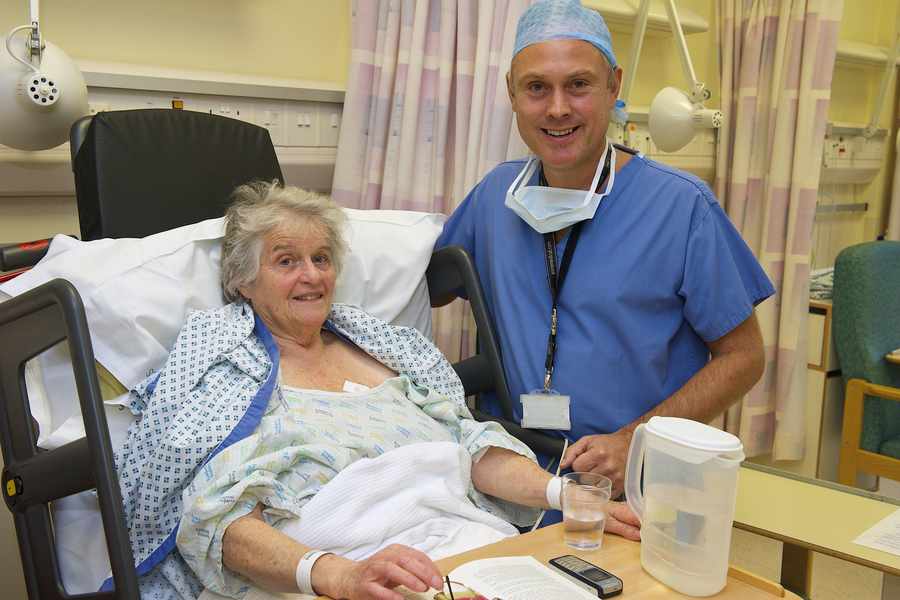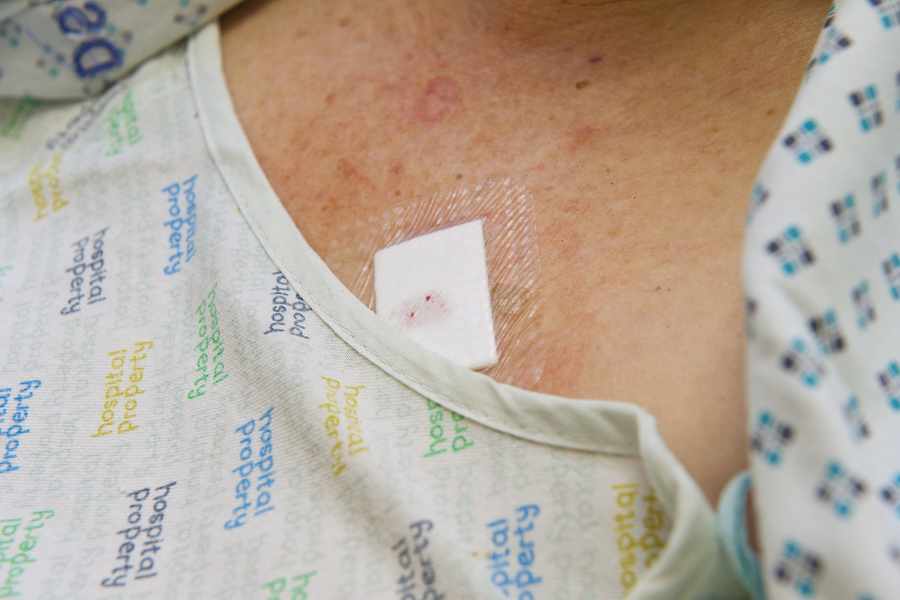The pioneering heart monitoring device, known as a Reveal Linq monitor, utilises wireless technology, usually reserved for wi-fi internet connections, to send information about a patient’s heart directly to their doctor.
- Each monitor costs £2,000 compared to £1,200 for the old version but that is likely to come down in price as more people are fitted with them.
- It took about four years to develop the new technology, which was made by Medtronic.[/breakout]
Currently the technology, which is so small it takes less than a minute to install and sits just under the skin near the heart, is implanted in theatre but staff say the procedure could be moved to outpatients by the end of the year.
A monitor was first fitted in Jersey in February last year when then 77-year-old Doreen Van Der Vliet became only the third person in Britain to be given the device.
Now, 12 months on, more than 30 Islanders have had the device implanted.
The Hospital’s consultant cardiologist, Dr Andrew Mitchell, said the technology had proved invaluable and that many illnesses, including at least one rare heart condition, had been diagnosed using the technology.
Dr Mitchell said that the devices, which have been developed by UK firm Medtronic, are usually implanted into patients who had suffered two or more unexplained blackouts.
‘It is an extremely helpful bit of kit,’ he said.
‘Before this we would have had to go through all sorts of examinations and had to wire people up to ECGs, which they would have to walk around with.
‘If people black out just once or twice a year it’s almost impossible to capture that. This is totally non intrusive.
Heart disease is a significant factor in the Island, as are cancer and respiratory diseases.
‘It has been used to diagnose at least one rare condition and we have explanted a few and diagnosed the need for pacemakers, which have then been implanted.
Dr Mitchell said that at £2,000 a piece the device might seem expensive but because of how easy it was to implant and how efficient it was at diagnosing illness it could save money in the long run.
‘Research has shown that these devices can cost less than traditional treatment. We are looking to move the procedure to outpatients’ before the end of the year,’ he added.
Meanwhile, Dr Mitchell, who wrote his MD thesis on implantable technologies, said work was being done behind the scenes to potentially introduce heart-monitoring pads that could be installed in the receptions of GP surgeries and pharmacies across the Island.
‘The idea is people can drop in without appointments and check their heart rhythm.
‘The machine will either show a green light, meaning all is well, or purple, meaning they should have a chat with their doctor,’ he said.
Dr Mitchell added that the technology was still in its very early stages.

In February last year, Jersey became one of the first places in Britain to offer a revolutionary new health procedure in the fight against heart disease – the Island’s biggest killer.
Scientists have harnessed wireless technology normally used to deliver wi-fi internet to homes and businesses to create a device that sends data about a patient’s heart directly to their doctor from anywhere in the world.
The tiny device, which is so small it takes less than a minute to implant, allows cardiologists to remotely observe any abnormalities in a patient’s heartbeat.
The technology could prove to be a life-saver for Islanders suffering from serious heart problems.
Doreen Van Der Vliet (77), who suffered a heart attack in January 2014, became just the third Briton to be fitted with the device last February.
In a procedure that took just 46 seconds, Jersey General Hospital’s consultant cardiologist Andrew Mitchell injected the device into a small incision on Mrs Van Der Vliet’s chest.
Dr Mitchell said that he was surprised at the speed of the procedure, describing it as ‘phenomenal’.
The Reveal Linq monitor, developed by UK firm Medtronic, will feed back information to the Hospital about her heart health for the next three years.
Dr Mitchell said: ‘It looks for fast heart rhythms, slow heart rhythms and irregular heart rhythms.

‘If it sees any of those, we will get an alert sent through to us on a secure website or a message to a mobile phone.’
An old version of the device has been available for almost a decade, but patients who felt unusual heart activity were required to hold a recording device to their chest, which would record recent data, and then contact the Hospital.
Patients also had to be admitted to hospital for day surgery for the monitor to be implemented, which Dr Mitchell said carried a higher risk of bleeding and bruising.
‘Traditionally you would have to open up the chest and insert the device in a more complicated procedure,’ he said.
‘Now the procedure is much quicker it will potentially allow us to move patients out of the theatre and into the outpatient unit, which would allow us to free up the theatre.’
Dr Mitchell said that Jersey’s early takeup of the device showed that the Hospital was embracing new medical technologies.
WHEN Doreen Van Der Vliet watched a segment on the ITV programme Daybreak about a new life-saving heart monitor, she had no idea that she would soon become part of medical history.
The 77-year-old St Helier resident but only realised how revolutionary the technology was when she saw the programme on the morning she was admitted to hospital.
Within an hour of receiving the implant, the former medical secretary was sitting up in her hospital bed chatting and posing for the JEP’s photographer.
She said: ‘It’s very good to be part of something so new.’ Mrs Van Der Vliet had been diagnosed with angina before she had a heart attack.
‘I went to Oxford in the emergency air ambulance and I had two stents inserted.
SAVVY businesses understand the merits of promising small and delivering big. It seems, however, that Digital Jersey and its new champion-in-chief, Senator Philip Ozouf, have taken the opposite route. The hype around the potential of this new sector of the economy has fuelled scepticism and what many fear is unrealistic expectation.
There is no doubt that Jersey punches well above its weight on a great number of stages, from finance to sport, but being told that our little island is going to be a world leader in a field where it is coming to the party a little late can be counter-productive.
Today, however, we get a glimpse of some substance behind the claims and the barrage of Senatorial tweets. For many years, Dr Andrew Mitchell, the Island’s consultant cardiologist, has been pioneering the use of the latest digital technology to improve health services in Jersey. His expertise and enthusiasm for exploring this new frontier has seen him build contacts around the world. His work has meant that Jersey really is at the heart of a revolution in healthcare.
Companies are approaching Jersey because they see the Island as a great place to roll out new technologies.
Dr Mitchell is exceeding expectations behind the hype and patients are benefiting. He has delivered big and others, especially expensive quangos should learn from that example.







